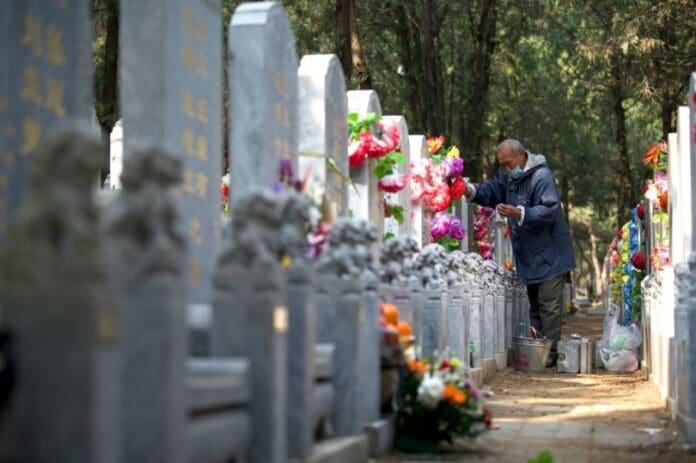There is an increasing need for digital cloning services amid millions of people visiting burials this week for the festival of grave cleaning. A new method of recalling and revitalizing their cherished relatives is emerging as thousands of people throughout China visit the graves of their loved ones to pay tribute to the yearly tomb-sweeping festival, the traditional day to honor and take care of the resting places of the deceased.
Some businesses marketed online allow Chinese netizens to make an animated digital portrait of their loved one for as little as 20 yuan (£2.20). Thus, this year, in honor of Thursday’s tomb-sweeping holiday, creative mourning uses artificial intelligence to communicate with the dead.
On the most advanced extreme of the range, Taiwanese artist Bao Xiaobai utilized artificial intelligence (AI) to “revive” his daughter, who passed away in 2022. Bao allegedly devoted over a year to exploring artificial intelligence technology, using just an audio clip of his daughter saying three lines in English. Eventually, he constructed a clip of his daughter wishing a birthday greeting to her mother that he shared in January.

In a conversation with Chinese media, Bao stated, “Various individuals near me believe that I’ve lost my sanity.” However, I would like to experience the way she speaks once again.

Digital clones of the deceased are becoming increasingly popular as China’s artificial intelligence sector develops towards human-looking avatars. Another projection places the value of the “digital individuals” trade at 12 billion yuan in 2022 and predicts it will triple by 2025. China’s internet businesses are skilled at generating digital humans partly because the nation’s massive live-streaming community, which brought in an estimated 5 trillion yuan in revenues last year, is increasingly using artificial intelligence (AI) to make clones of themselves to promote items around the clock.
SenseTime, a prominent artificial intelligence business in China, showcased its capabilities at its yearly shareholder meeting last month. Tang Xiao’ou, the founder and CEO of the company, gave a speech. “Hey everyone, let’s get together again,” Tang said to the staff. “Everyone had a difficult year last year, but bad things will fade away soon.”
Tang’s 2023 was incredibly challenging because, on December 15, he passed away at the tender age of 55. The digital clone that spoke his words was educated by SenseTime’s developers using a substantial language model based on machine learning software that was fed videos and audio recordings of Tang.

This kind of equipment is beneficial during the tomb-sweeping celebration. On Weibo, an application developer claimed to have assisted over 600 people in having reunions with their relatives this year.
However, not only those who have lost a loved one employ artificial intelligence to bring them back to life. Social media fans have recently been creating fresh videos featuring the late artist Qiao Renliang, who passed away in 2016. In one video, the artificially intelligent version of Qiao states: “Well, I had never truly left.” However, Qiao’s parents are upset because their son committed suicide. According to quotes from his father in Chinese media, the film disclosed wounds and was not made with permission from the family.
![Actor/singer Qiao Renliang dies from possible depression[1]- Chinadaily.com.cn](https://www.chinadaily.com.cn/life/images/attachement/jpg/site1/20160918/f8bc126e491619482e5d06.jpg)
Some Chinese attorneys believe that if this kind of content hurts the surviving family of the deceased, it needs to be against the legislation. However, China’s digital natives will probably explore digital afterlives more quickly than active authorities can control them as mourners prepare for the tomb-sweeping holiday.




